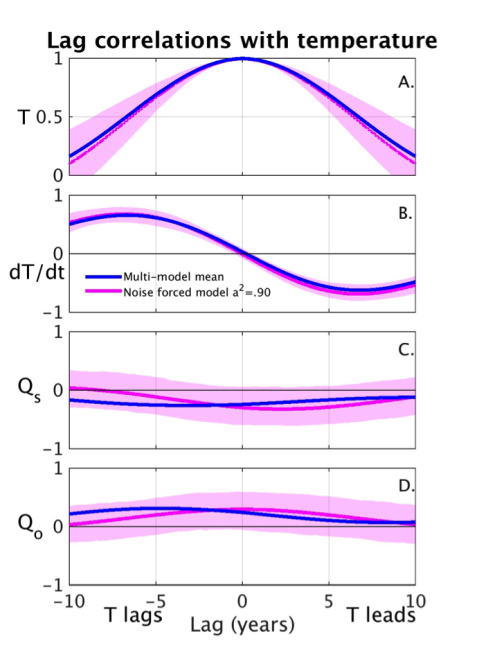A cautionary note on the use of surface heat fluxes to diagnose the causes of the Atlantic Multidecadal Oscillation
The Atlantic Multidecadal Oscillation (AMO) is a naturally occurring pattern of sea surface temperature change that is seen in the North Atlantic Ocean on decadal timescales and affects weather and climate. Some have suggested that the AMO is a consequence of variable large-scale ocean circulation. Yet new research by Clement and coauthors suggest otherwise.

Clement et al. show that the main features of the observed AMO are reproduced in models where the ocean heat transport is prescribed, and thus the Atlantic Meridional Overturning Circulation (AMOC) cannot be the driver. Allowing the ocean circulation to interact with the atmosphere did not significantly alter the characteristics of the AMO in current-generation climate models.
An attempt to challenge this result was made in a technical comment by Zhang et al. (2016) using the low-pass surface heat budget. Clement et al. published a response together with the Zhang et al. comment in Science, in which they use Zhang et al.’s results to show that the low-pass surface heat budget reflects a long-term balanced state. Thus it cannot be used to infer causality and cannot speak to the causes of the AMO. Clement et al. showed that the diagnostic used by Zhang et al. can be explained with minimal ocean influence, see figure. Therefore, the finding that surface heat flux is out of the ocean at low frequencies does not demonstrate an important role for the ocean circulation in driving the AMO. Rather, while the ocean may be doing something to the surface energy budget in parts of the subpolar gyre in coupled models, its effect on the AMO is small compared to the stochastic atmospheric forcing.
Finally, Clement et al. note that the argument for a role for ocean dynamics, namely the AMOC, pertains to a particular region of the subpolar gyre. It is, as yet, unsettled how this region relates to the basin-wide warming that is the AMO and the associated impacts on Atlantic hurricanes, and temperature and precipitation patterns around the circum-North Atlantic.
1Rosenstiel School of Marine and Atmospheric Science, University of Miami
2Lamont-Doherty Earth Observatory of Columbia University
3Max Planck Institute for Meteorology
Topics
- Modeling
- Atlantic Ocean
- AMOC
